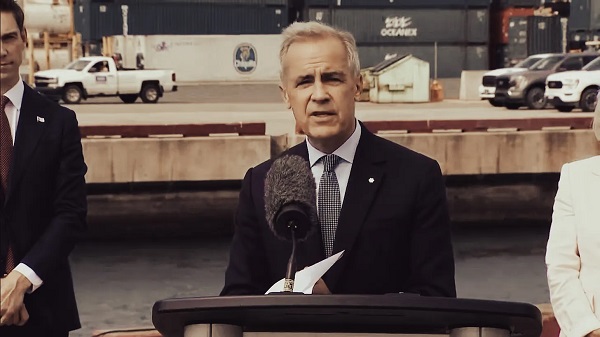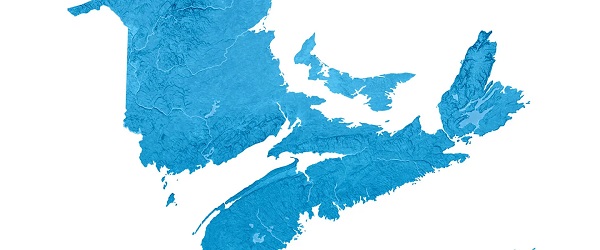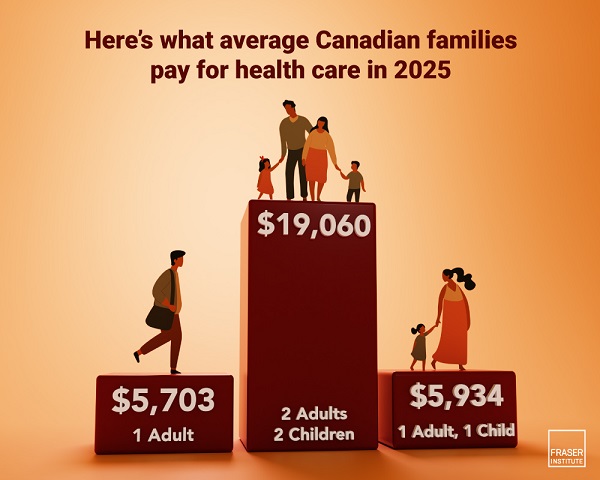COVID-19
Post-pandemic: Canada desperately needs an impartial COVID-19 inquiry
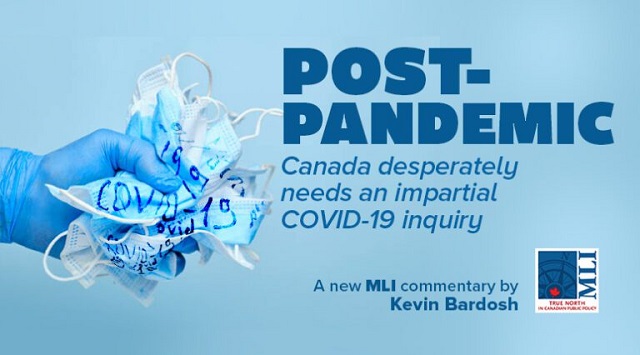
From the MacDonald Laurier Institute
By Kevin Bardosh
Now that the panic has subsided, it is time to move to a thoughtful and objective Covid evaluation to investigate the social harms created by government infection control policies.
Nearly four years after the Canadian government first imposed unprecedented Covid-19 policies, the nation still lacks a coherent plan for how to evaluate the effectiveness of these policies and their costs and consequences.
Sadly, recent efforts to promote a federal inquiry do very little to diminish concerns that key scientific and policy questions – about lockdowns, school closures, masks, contact tracing and vaccine mandates – will go unanswered. Rather than seriously questioning the dominant covid policy approach, these efforts toward an inquiry parrot a set of misguided axioms set on justifying and institutionalizing them for the future.
A series of articles in the British Medical Journal (BMJ) called for an independent Canadian Inquiry in mid-2023 (Clark et al. 2023). Supportive editorials were written by most Canadian media outlets and a launch event for the series was supported by the Royal Society of Canada. Yet, despite the BMJ series being entitled “Accountability for Canada’s Covid-19 response”, scientific data that contradict the necessity of government infection control policies as well as the social harms to Canadian society from these far-reaching policies were largely ignored.
The BMJ article series assumes a unique form of implicit bias and faulty logic that I have called Covidization, and which has predominated as the mainstream position in government, media, the courts, academia and medicine since 2020 (Bardosh, 2023a). ’Covidization’ over-states the evidence supporting Covid policies and downplays the evidence of their harm, or unintended consequences. It also assumes that more centralized government action was needed to control the virus and valorises population compliance. Take, for example, one of the most cited sentences in the BMJ series:
“What saved Canada was a largely willing and conforming populace that withstood stringent public health measures and achieved among the world’s highest levels of vaccination coverage. In other words, Canadians delivered on the pandemic response while its governments faltered.”
This mainstream position also inverts the burden of proof and contradicts key principles of public health ethics (Jamrozik, 2022): it is critical to appreciate that most Covid policies were not recommended for use during a viral respiratory pandemic by the World Health Organization and most governments pre-2020 because the evidence was weak and the anticipated harms substantial (Bardosh, 2023a). Pre-2020, the various vaccine mandates and passports used during the pandemic were also generally believed to be unethical and against the Canadian Charter of Rights and Freedoms (Bardosh et al. 2022).
Yet the social atmosphere of fear and panic during the pandemic re-engineered axiomatic truths and governance models including accepted ethical standards (e.g. precautionary principle) and cost-benefit analysis in decision-making. Instead, a narrow logic that approaches infection control a priori as the highest moral goal reigned.
The BMJ series is worrying because it was modelled on a similar article series launched just before the UK began its own formal Covid Inquiry (McKee et al. 2022), which began in June 2023 (Bardosh, 2023b). The UK-focused BMJ articles were written, in part, by prominent advocates of Zero Covid, who, like China, promoted stricter containment believing the virus could be eliminated. This position went on to be reflected, in varying degree, in the biases and assumptions of the UK Public Inquiry itself.
The UK Inquiry will run until 2026 and is estimated to be the most expensive British public inquiry ever, costing taxpayers £300-500 million. Yet the structure of the inquiry has given preferential status to bereaved family groups through legal representation, who are set on blaming the government for the death of their family members. This means that key assumptions about the effectiveness and appropriateness of Covid measures are simply taken for granted. Prominent scientists who advised the government, especially epidemiological modellers, have also been given preferential treatment by the barristers and the few scientists providing an alternative position, such as one more aligned with the idea of focused protection outlined in the Great Barrington Declaration (Kulldorff et al. 2020), have been largely maligned and ignored (Bardosh, 2023c).
The convergence between the UK inquiry and a possible Canadian inquiry may be more likely than anticipated. According to Canadian journalist Paul Wells, rumour has it that Prof. Sir Mark Walport, who testified to the UK Inquiry and recently chaired a UK Royal Society review on Covid interventions that ignored key data and the costs and consequences to society (Bardosh, 2023d), could head a Canadian inquiry (Wells, 2023). This has yet to be confirmed or denied.
Herein lay a central problem: those who advocated for Covid policies are now called to evaluate them. Epidemiological models and observational studies have been given substantial weight by government and public health agencies despite confounding effects, data reliability issues, incorrect assumptions, circular reasoning and inappropriate claims of causality (Grant et al. 2022; Doidge et al. 2022; Vickers et al. 2023).
In a desperate failure to ‘follow the science’, too many individuals in the mainstream medical establishment continue to frame efforts to question Covid policies as ‘misinformation’ or ‘revisionism’ (Murdoch and Caulfield, 2023). This perspective cherry-picks the evidence and ignores the totality of data on policies such as school closures, mask mandates and lockdowns (Fitzpatrick et al. 2022; Vickers et al. 2022). It also ignores other factors that can explain Covid epidemiological trends: seasonality, innate immunity, voluntary risk reduction and herd immunity (Bardosh, 2023e).
Worryingly, provincial and federal governments are not required by law to evaluate the health, social or economic consequences of any emergency response in Canada, including Covid (Khoury et al. 2022). This leaves fundamental questions unanswered: Did government policies cause more harm than good? What should we do next time?
Now that the panic has subsided, it is time to move beyond the Covidization groupthink. Any thoughtful and objective Covid evaluation should be evidence-based and take as a starting position the investigation of social harms created by government infection control policies (Bardosh, 2023a).
This includes consequences on health and health services, such as an alarming mental health crisis (Agostino et al. 2021; Frounfelker et al. 2022; Jenkins et al. 2022) and rise in non-Covid excess mortality, for example due to drug overdoses among young people (Dmetrichuk et al. 2022; Lee et al. 2022). It includes a range of negative lifestyle changes that appear to be compounding risks for noncommunicable diseases: exercise, obesity, sleep, screen use, diet, addiction, frailty, and child development (Andreacchi et al. 2022; Colucci et al. 2022; Shillington et al. 2021; Potvin et al. 2022).
Pandemic policies closed businesses and shifted employment patterns, whilst also dramatically increasing government spending, debt and inflation (CFIB, 2021; Moran et al. 2022; Lemieux et al. 2020; Razak et al. 2022). What are the consequences and long-term legacy of these economic impacts? And, of course, economic consequences are likely to have had adverse effects on general well-being. It remains unclear how useful the vast government financial assistance programs really were (Kroebel et al. 2021).
The social fabric of Canada was also ruptured, with significant effects on domestic violence, child abuse, gender relations and social polarization (Baker et al. 2023; Smith, 2022; Wu et al. 2022; Wathen et al. 2022). Pandemic policies impacted children and teenagers at crucial points in their education and psychosocial development and are predicted to have various long-term consequences (Cost et al. 2022; Haeck and Larose, 2022). Studies on university students consistently show that well-being, social relationships, financial stress, quality of learning and optimism about future job prospects were impacted (Appleby et al. 2022; Houlden and Veletsianos, 2022).
Socio-economic groups were affected in different ways. A generational paradox emerged: the virus itself caused minimal mortality among younger people who were most severely impacted by pandemic disruptions (Ciotti et al. 2022). More marginalized and vulnerable social groups also experienced disproportionate mental health and socio-economic effects (Jenkins et al. 2022). The quality of social services diminished as a result of accommodating social distancing protocols (Baker et al. 2023; Wathens et al. 2022). And the elderly were often isolated and locked-up in care facilities under inhumane conditions (Saad et al. 2022; Chu et al. 2022; Rangel et al. 2022).
The civic infrastructure of democratic accountability also eroded (Baron and Van Geyn, 2023), with significant consequences for human rights, civil liberties, and checks on executive power (Joffe, 2021; Mykhalovskiy et al. 2022). Debate was, for the most part, abandoned at our institutions of higher education. An artificial ‘consensus’ was manufactured by the mainstream media (Capurro et al. 2021; Labbe et al. 2022; Norman et al. 2022). Science itself was politicised and a profound failure occurred in multidisciplinary scientific policy advice. The advice offered to policymakers focused almost exclusively on a pathogen-centric perspective (Bhatia et al. 2023) and disregarded the expertise of other relevant disciplines. Population compliance was supported through unprecedented laws on protest, data privacy and media freedom largely upheld by the courts (Ballard et al. 2021; CCLA, 2021; McClelland Luscombe, 2021). Growing public distrust culminated in the 2022 Ottawa Trucker Convoy protest while the biases of the Rouleau Commission that upheld the use of the Emergencies Act revealed similar failures in government accountability (Alford, 2023).
Despite these varied impacts on Canadians, no major scientific and institutional effort has emerged to collate and analyze the full data on these societal harms and explore their implications for pandemic policy. Two recent efforts are, nonetheless, worth mentioning. First, the new conservative premier of Alberta, Danielle Smith, commissioned a public health emergency governance review which recommended, among other things, broader expertise in management and science advice and the need to better protect rights and freedoms (Kelly-Gagnon et al. 2023). Second, a grassroots independent movement recently completed a National Citizen Inquiry (2023), based on public testimony from a 7-city tour, and has released a final report focused on the varied impacts of Covid measures on society.
The Federal government can call for a national commission of inquiry at any time and set the scope and format. Such inquiries have had lasting institutional impact in the past; the Canadian blood services emerged from the stained blood scandal in the 1980s. And their tendency to keep an issue in the news cycle helps ensure institutional change (Stutz, 2008).
However, before any Canadian inquiry takes place, it is critical that a reversal of perspective occurs about the key questions (Norfolk Group, 2023). Scientific analysis about the effectiveness of Covid policies in Canada need to be approached in an attitude of impartiality and with a willingness for self-criticism. The data on policy harms need to be taken seriously. This is certainly within the remit of the Public Health Agency of Canada, the Canadian Institutes of Health Research, the Social Sciences and Humanities Research Council of Canada, and many other government agencies.
All things considered, it would be wise to establish an independent scientific review with sufficient broad support, expertise and neutrality outside government. This could then inform the establishment of any future public inquiry. Otherwise, like the UK Covid Inquiry, we risk eschewing a critical and objective assessment of the evidence and the difficult policy trade-offs between infection control, social harm and civil liberties.
Canada needs a proper Covid inquiry but ensuring that the public gets one will require political acumen, scientific rigor and a correct orientation toward the key social, political, and medical questions at stake.
About the author
Kevin Bardosh, PhD is Director and Head of Research at Collateral Global, a research institute and educational charity based in the UK. He is also affiliated with the School of Public Health, University of Washington and Edinburgh Medical School. A Canadian, he has worked in more than 20 countries around the world on infectious disease research and control programs, including in the response to Zika and Ebola.
COVID-19
Canadian gov’t to take control of vaccine injury program after reports of serious mismanagement

From LifeSiteNews
The Canadian federal gov’t will take over the Vaccine Injury Support Program from Oxaro by March 2026 following reports of misallocated funds, unresolved claims, and unprofessional conduct.
The federal government is taking over Canada’s vaccine injury program after reports have discovered mismanagement.
The Public Health Agency of Canada (PHAC) is expected to take control of the Vaccine Injury Support Program (VISP) beginning on March 31, 2026, after a Global News report exposed the program for misallocating taxpayer funds and disregarding many vaccine-injured Canadians.
“We will publicly share further details on how the program will be delivered under PHAC when they become available,” Guillaume Bertrand, director of communications for Health Minister Marjorie Michel, told Global News.
Bertrand revealed that the government contract with Oxaro, the company tasked with running the VISP, will end in March, after which the federal government will take control.
“This is also part of our commitment to significantly reducing reliance on external consultants, while improving the capacity of the public service to hire expertise in-house,” Bertrand said.
Canada’s VISP was launched in December 2020 after the Canadian government gave vaccine makers a shield from liability regarding COVID-19 jab-related injuries; however, mismanagement within the program has led to many injured Canadians still waiting to receive compensation, while government contractors grow richer.
In July, Conservatives penned a letter calling for an investigation into the failing program, saying, “Despite the $50 million contract, over 1,700 of the 3,100 claims remain unresolved. Families dealing with life-altering injuries have been left waiting years for answers and support they were promised.”
Furthermore, the claims do not represent the total number of Canadians injured by the allegedly “safe and effective” COVID shots, as inside memos have revealed that Public Health Agency of Canada (PHAC) officials neglected to report all adverse effects from COVID shots and even went as far as telling staff not to report all events.
The PHAC’s downplaying of vaccine injuries is of little surprise to Canadians, as a 2023 secret memo revealed that the federal government purposefully hid adverse event reports so as not to alarm Canadians.
Of the $50.6 million that Oxaro Inc., has received, $33.7 million has been spent on administrative costs, compared to only $16.9 million going to vaccine-injured Canadians.
The letter further documented former VISP employees’ concerns that the program lacked professionalism and outlining what Conservatives described as “a fraternity house rather than a professional organization responsible for administering health-related claims.”
“Reports of constant workplace drinking, ping pong, and Netflix are a slap in the face to taxpayers and the thousands of Canadians waiting for support for life altering injuries,” the letter continued.
The federal government has ordered an audit into VISP. In late July, PHAC revealed that it is expediting its audit in light of reports of mismanagement within Oxaro.
COVID-19
Freedom Convoy leader slams Canadian gov’t agency for praising its treatment of protesters

From LifeSiteNews
Tamara Lich begs to differ with the Department of Public Safety’s claim that it acted with high ‘moral’ standards during the Freedom Convoy protests.
Freedom Convoy leader Tamara Lich is calling out Canada’s Department of Public Safety for “lies” after it boasted via an internal audit that it acted with a high “moral” standard in dealing with the 2022 protest against COVID mandates.
Lich made the comments on X earlier this week regarding a recent Department of Public Safety internal audit that heaped praise on itself for having “ethics” as well as a “moral compass” in dealing with the 2022 protesters.
The reality is that the self-boasting report comes after it was made known the Department of Public Safety had a role in spreading false claims that the Freedom Convoy was violent and was somehow funded by Russia.
As reported by Blacklock’s Reporter, the audit did not mention the false claims it made against the Freedom Convoy, which were used to allow then-Prime Minister Justin Trudeau to impose the Emergencies Act (EA) to clear out the protesters.
Indeed, in 2023, as reported by LifeSiteNews, disclosed records showed that Canada’s Department of Public Safety fabricated a security bulletin that claimed the Freedom Convoy protesters had plundered federal office buildings in an apparent attempt to discredit the movement.
The fake bulletin was sent out on January 28, 2022, at 3:54 p.m. and read: “We have received confirmation that protesters have started to enter office buildings in the Ottawa downtown core and are allegedly causing damage.”
The department’s recent boasting about itself, however, claimed that “(v)alues and ethics serve as a moral compass, guiding and establishing benchmarks for behaviour, decisions, actions and culture within organizations, including the public sector.”
“Federal public servants have a duty to preserve public trust and uphold a professional, non-partisan public service,” the internal audit noted.
Lich: Trudeau officials spread ‘lies, misinformation, disinformation, and division nationwide’
Regarding the recent audit, Lich noted that the Public Order Emergency Commission (POEC) hearing, which was tasked with investigating Trudeau’s use of the EA to crush the Freedom Convoy in mid-February 2022, “showed no violence or threats to national security during the 2022 Freedom Convoy.”
“It revealed a cycle between media and law enforcement, each repeating unverified talking points from the other. Despite widespread support along highways, overpasses, and communities, the CBC and other taxpayer-funded media missed an opportunity to unite Canadians,” she wrote.
Lich believes that Trudeau’s governmental departments “instead” spread “lies, misinformation, disinformation, and division nationwide.”
“Consequently, some of us face regular death threats, hate mail, threats of violence, and public harassment,” she wrote.
“Thankfully, we receive much more love and support, but the damage is done, which is exactly what they were aiming for.”
The sentencing trial for Lich and fellow Freedom Convoy leader Chris Barber took place in July at a hearing. Earlier this year, they were found guilty of mischief in their roles in the 2022 convoy.
As reported by LifeSiteNews, Lich revealed that the Canadian federal government is looking to put her in jail for no less than seven years and Barber for eight years.
A sentencing hearing has been scheduled in their case for October 7 in Ottawa.
The Freedom Convoy protest took place in early 2022 in Ottawa and featured thousands of Canadians calling for an end to COVID mandates.
In response, Trudeau’s federal government enacted the Emergencies Act on February 14, 2022, to shut down the popular movement.
Trudeau had disparaged unvaccinated Canadians, saying those opposing his measures were of a “small, fringe minority” who hold “unacceptable views” and do not “represent the views of Canadians who have been there for each other.”
Trudeau revoked the EA on February 23 after the protesters had been cleared out.
-

 International1 day ago
International1 day agoFrance records more deaths than births for the first time in 80 years
-

 National1 day ago
National1 day agoChrystia Freeland resigns from Mark Carney’s cabinet, asked to become Ukraine envoy
-

 Automotive2 days ago
Automotive2 days agoMichigan could be a winner as companies pull back from EVs
-
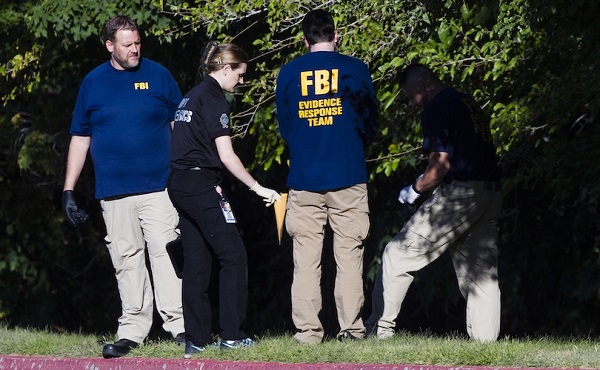
 Crime2 days ago
Crime2 days agoCanadian teacher showed Charlie Kirk assassination video to young students, said he deserved to die
-

 Business1 day ago
Business1 day agoOttawa’s so-called ‘Clean Fuel Standards’ cause more harm than good
-

 Energy18 hours ago
Energy18 hours agoA Breathtaking About-Face From The IEA On Oil Investments
-

 Alberta1 day ago
Alberta1 day agoParents group blasts Alberta government for weakening sexually explicit school book ban
-

 Business1 day ago
Business1 day agoThe Truth Is Buried Under Sechelt’s Unproven Graves

